Nurses Narratives Staff Nurse Leila Brown - Part 1
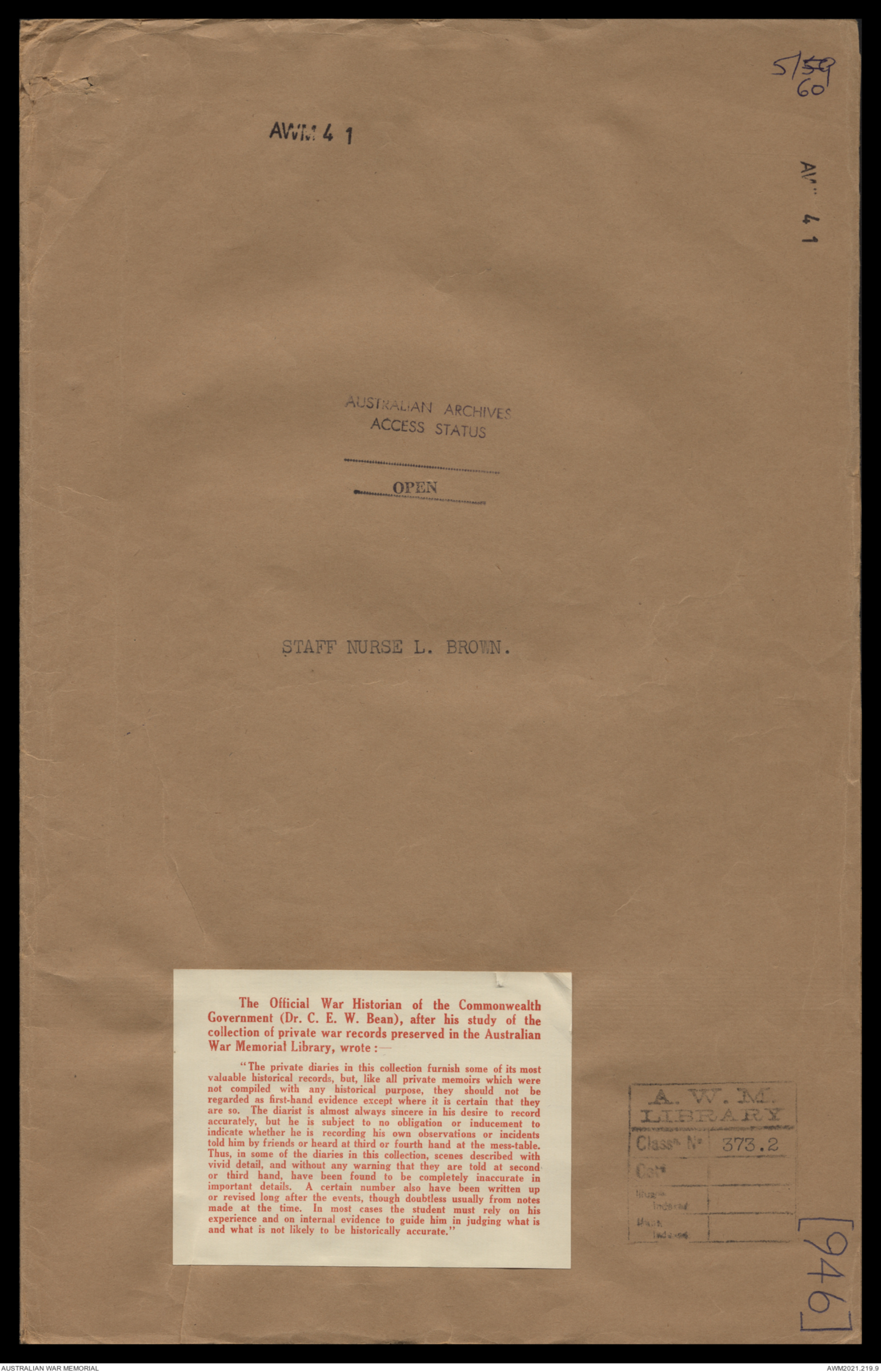
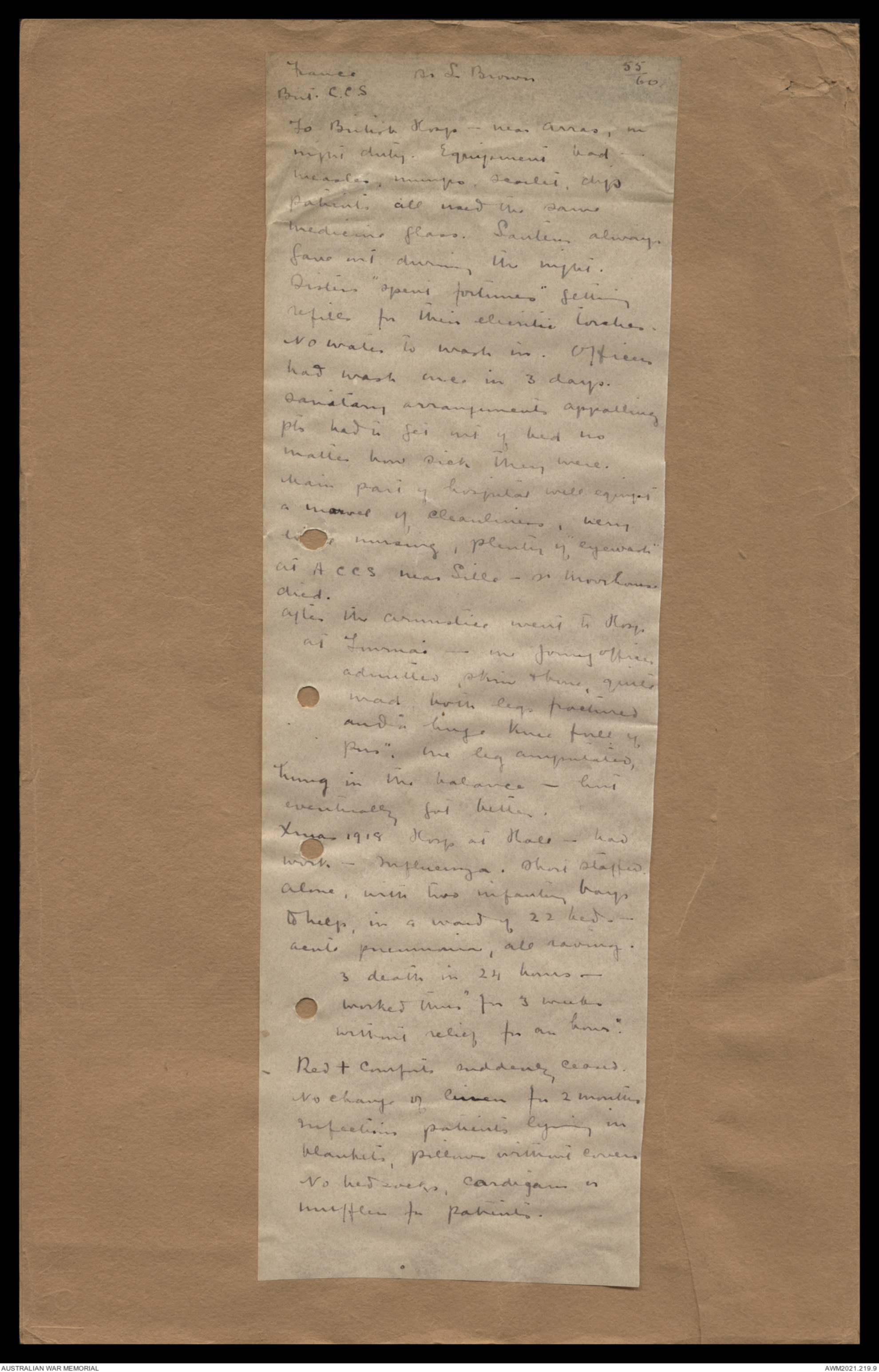
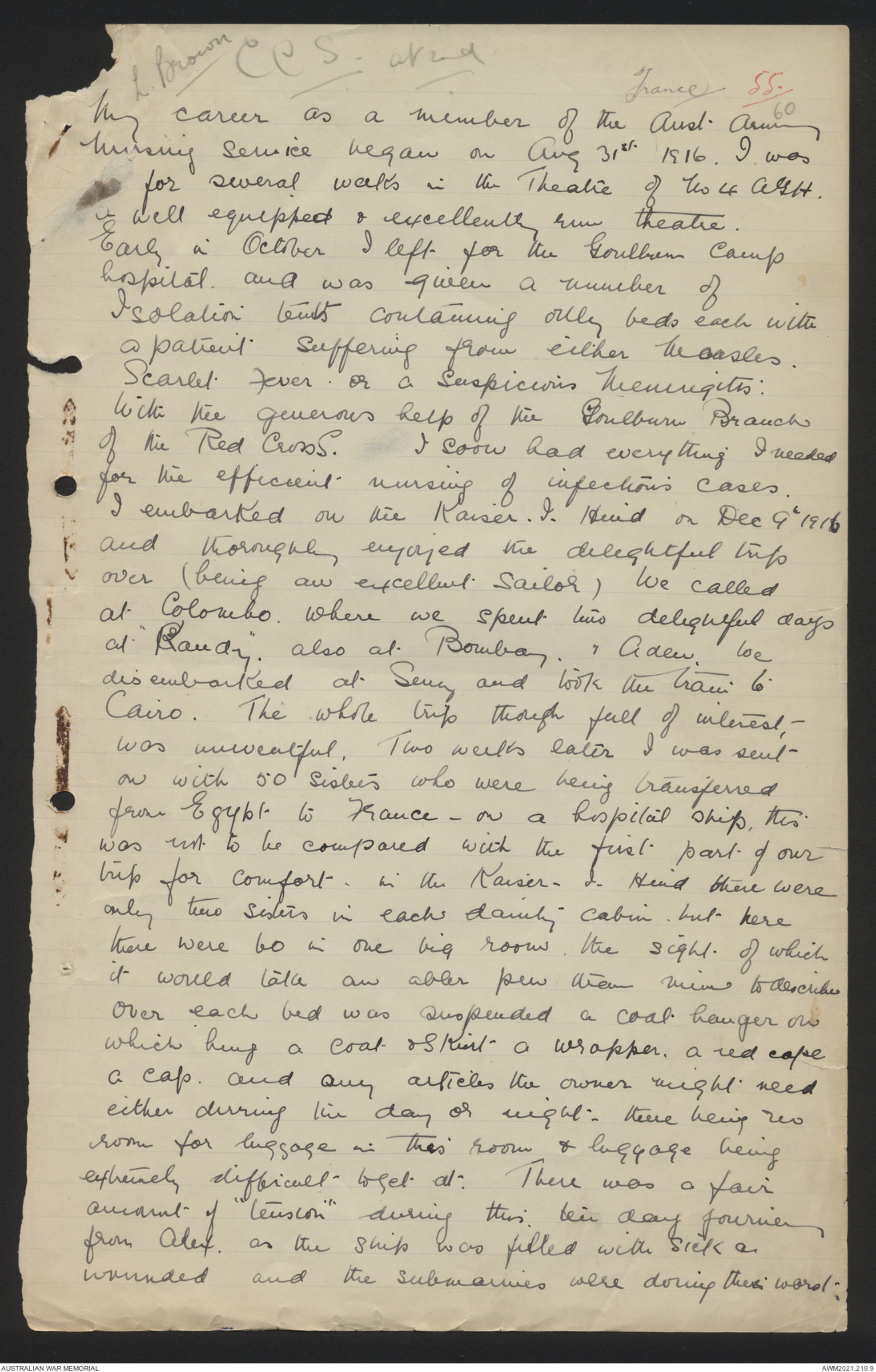
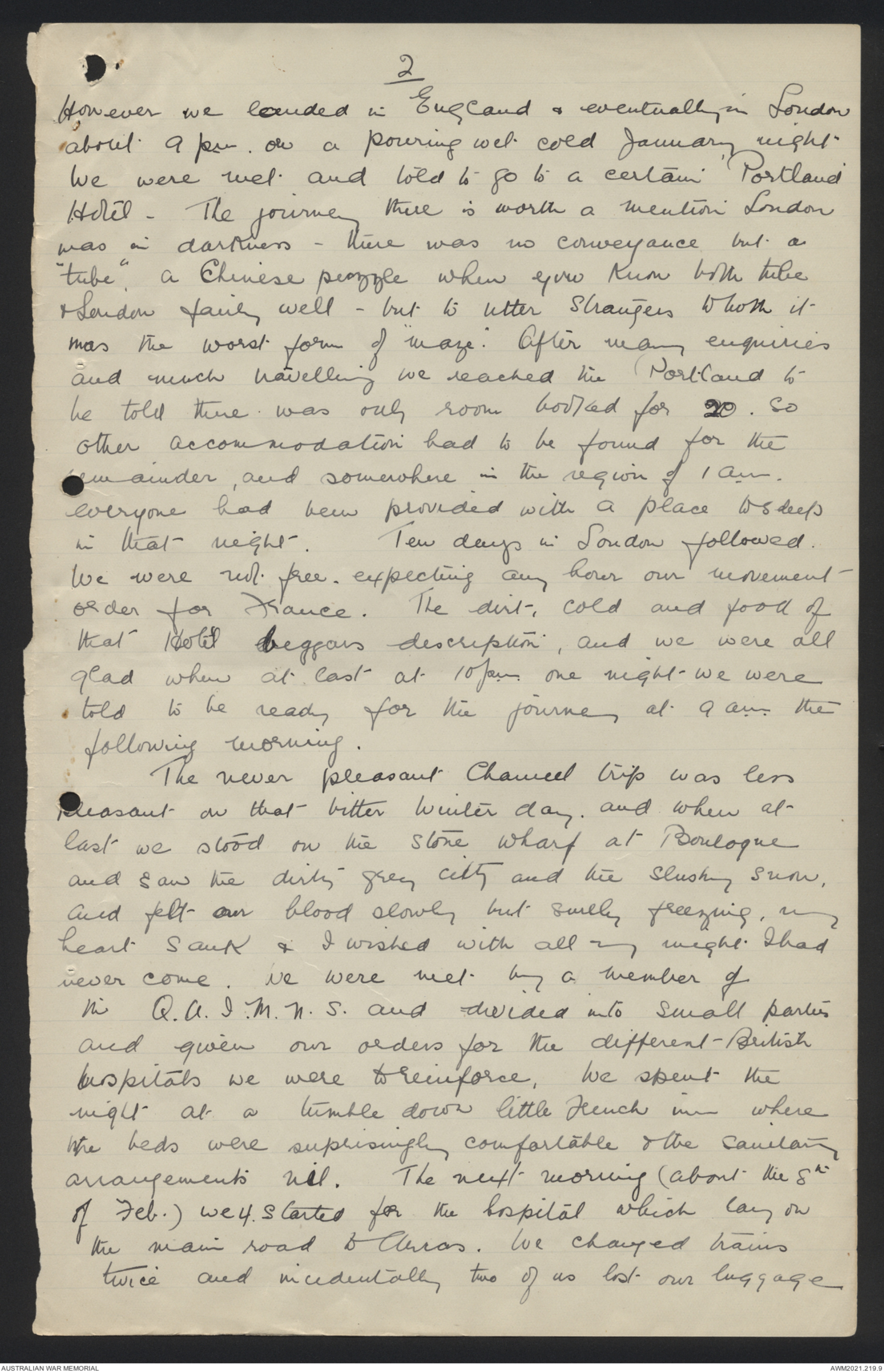
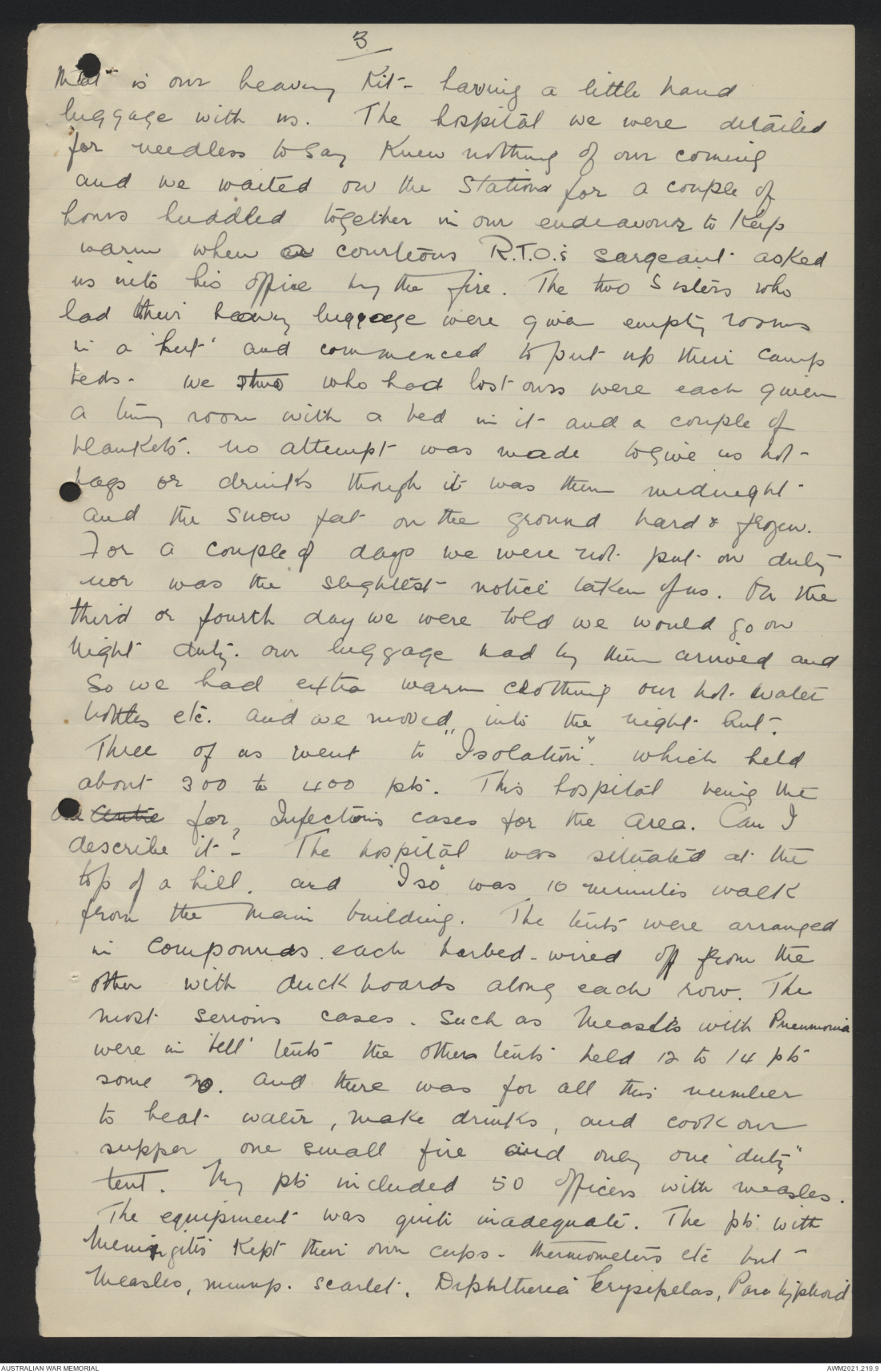
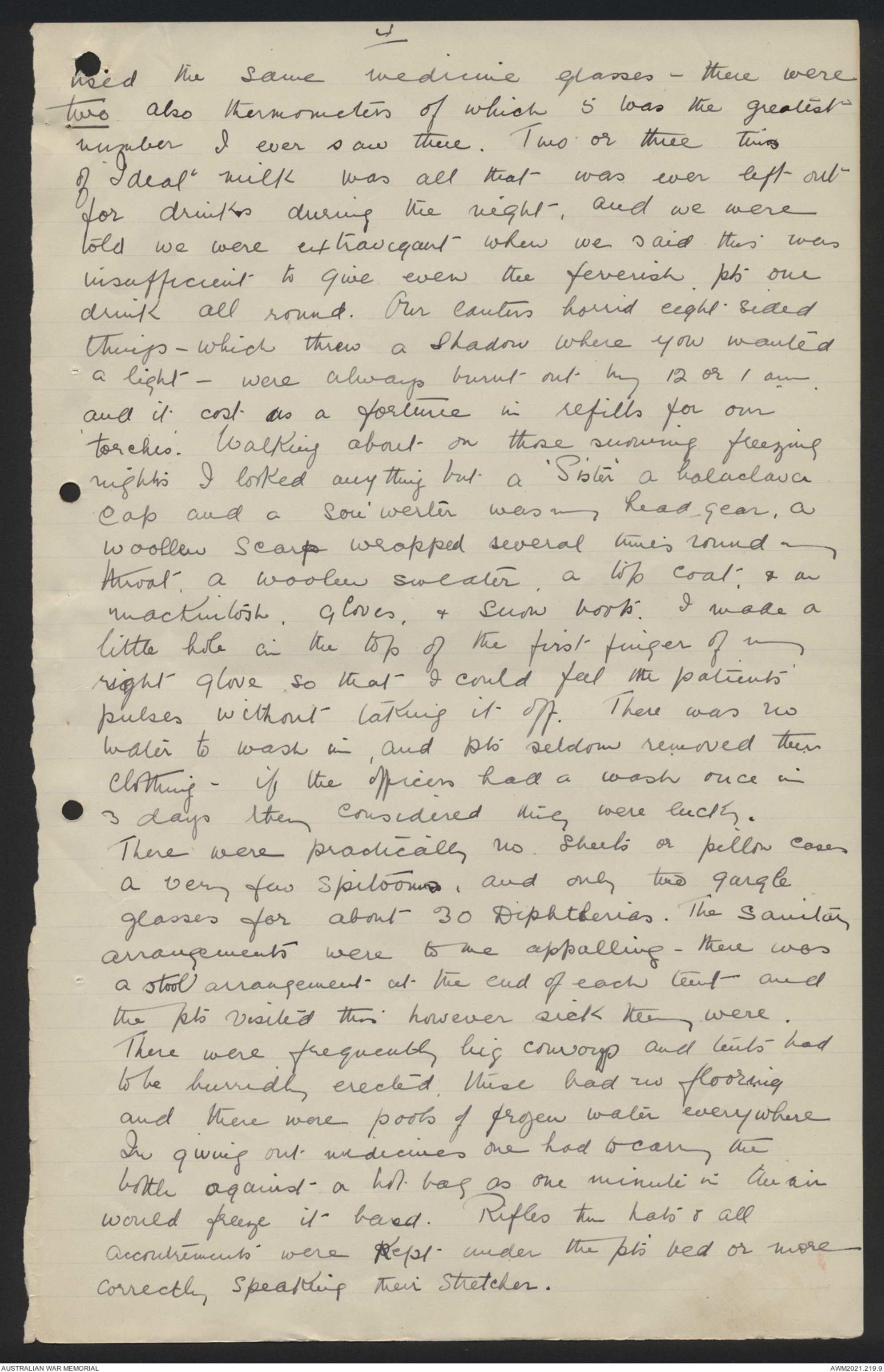
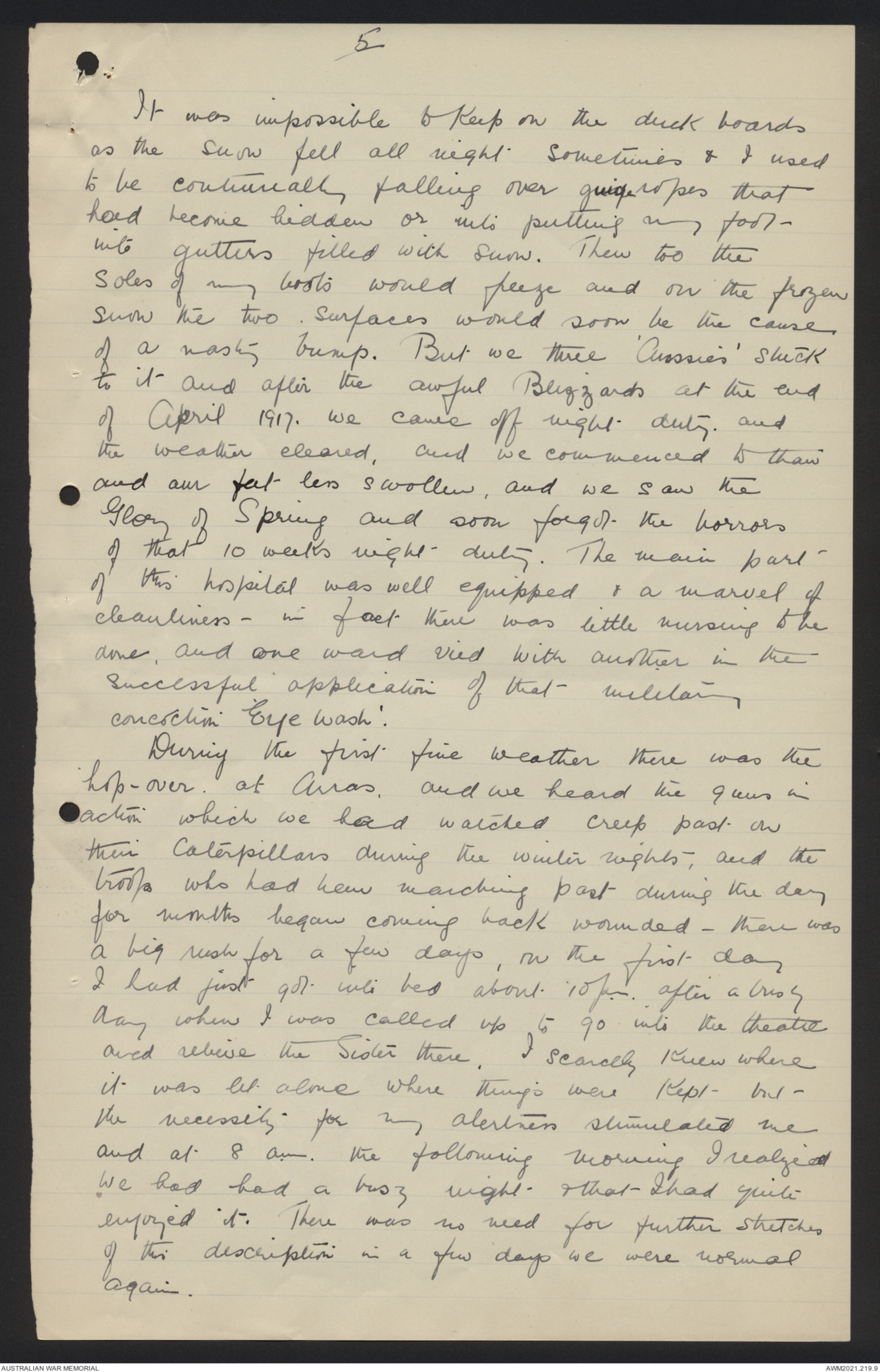
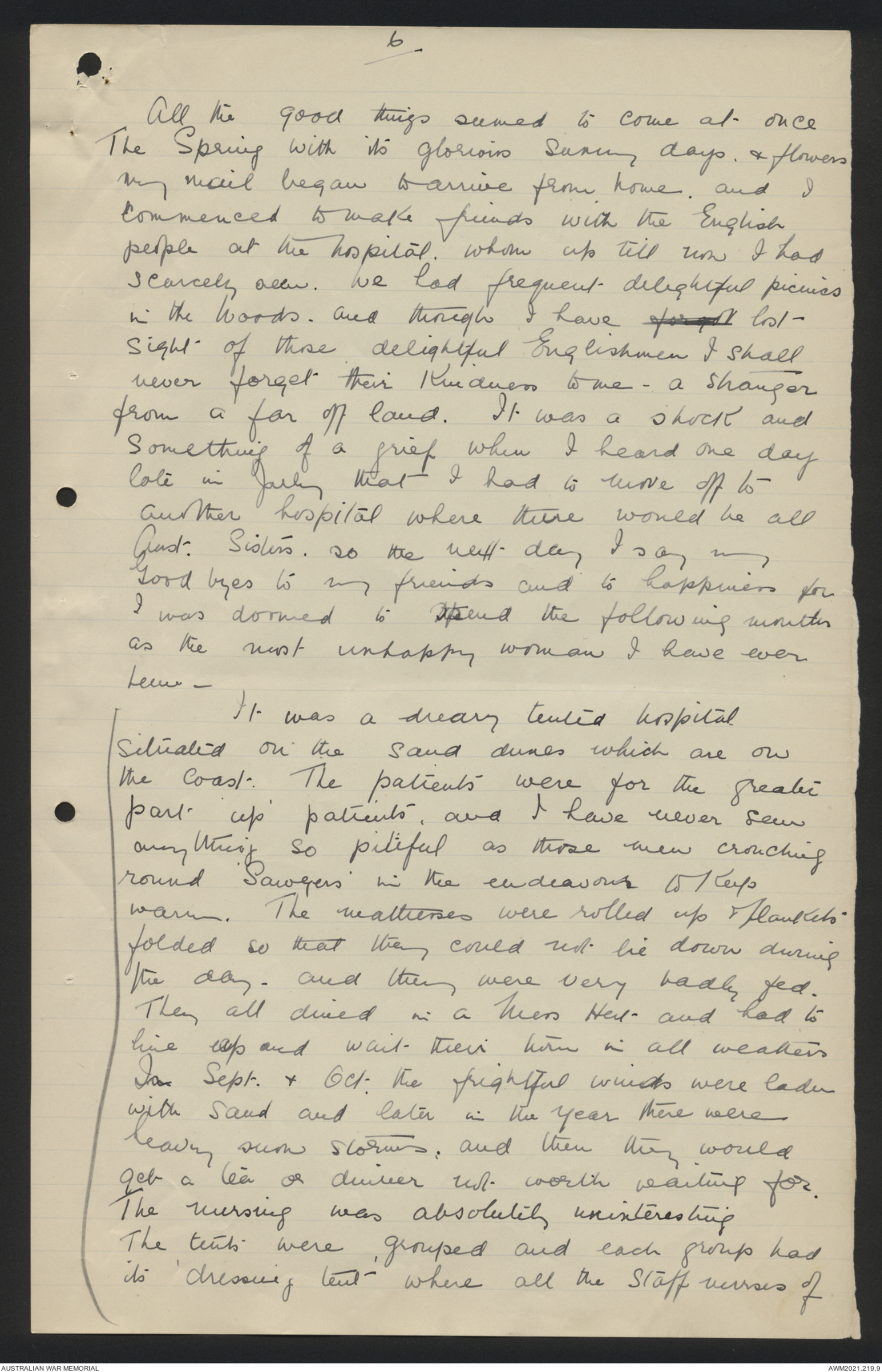
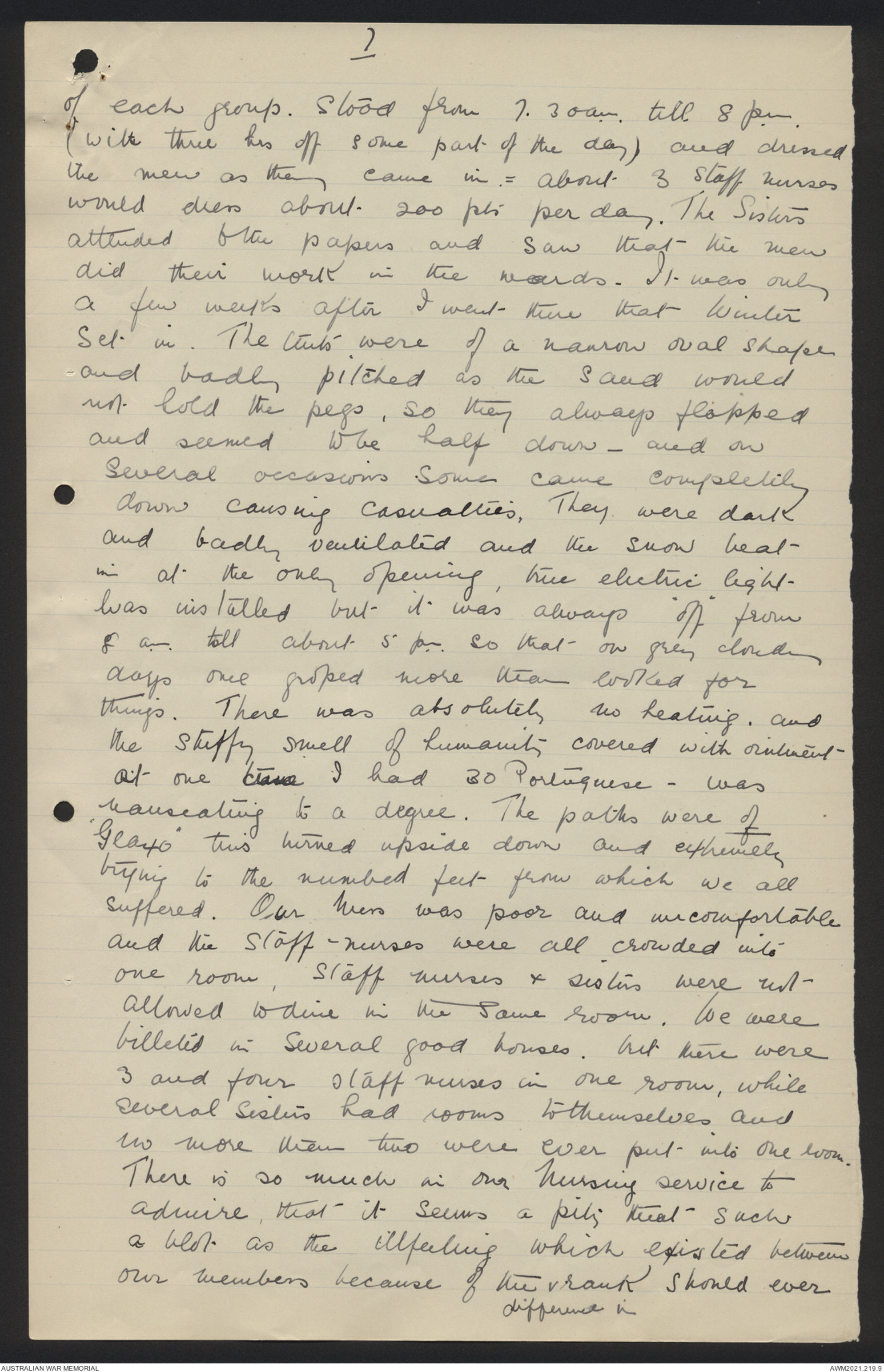
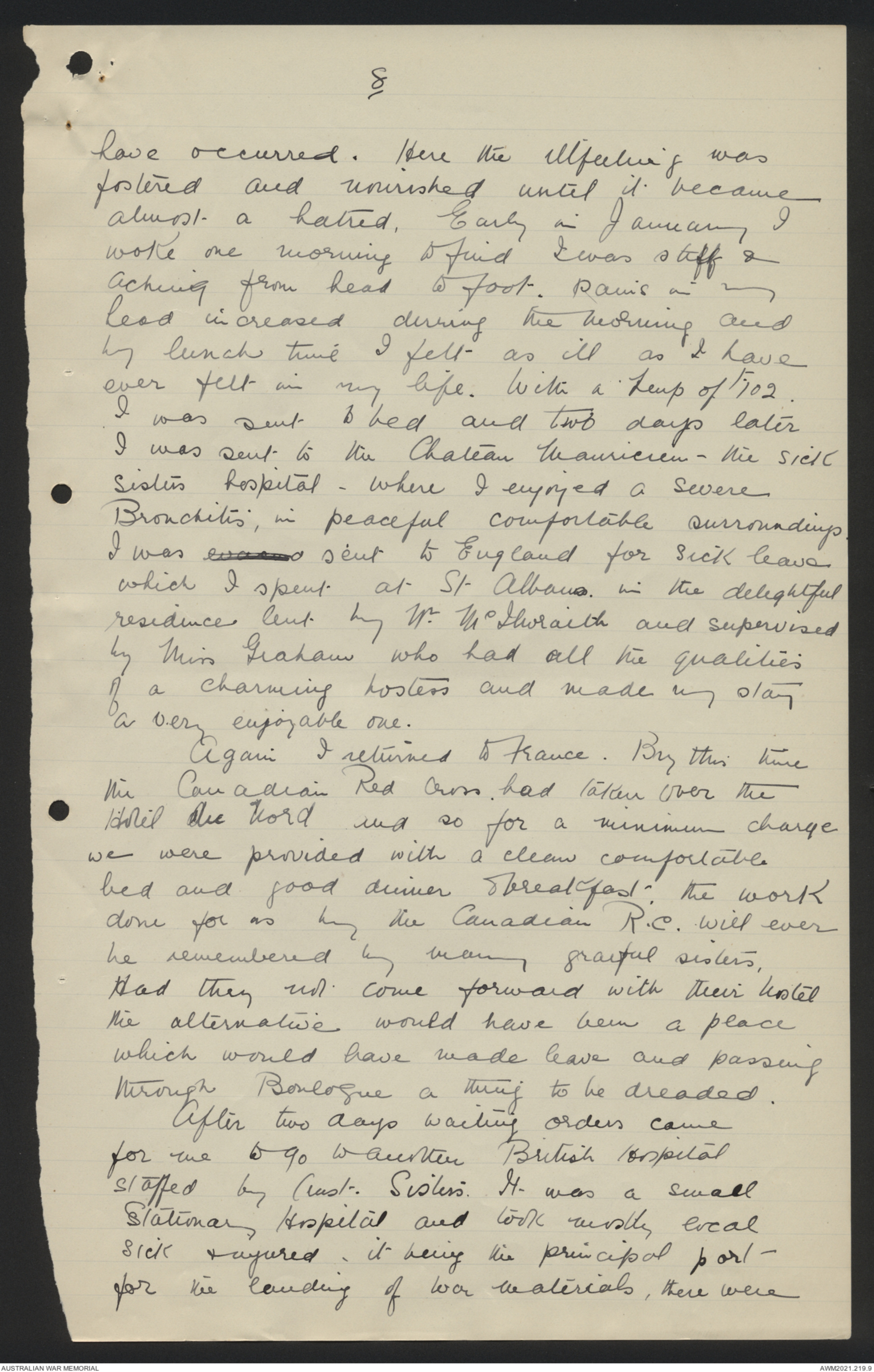
5/ 59 60
AWM 41
AUSTRALIAN ARCHIVES
ACCESS STATUS
OPEN
STAFF NURSE L. BROWN.
The Official War Historian of the Commonwealth
Government (Dr. C. E. W. Bean), after his study of the
collection of private war records preserved in the Australian War Memorial Library, wrote:-
"The private diaries in this collection furnish some of its most valuable
historical records, but, like all private memoirs which were
not compiled with any historical purpose, they should not be
regarded as first-hand evidence except where it is certain that they
are so. The diarist is almost always sincere in his desire to record
accurately, but he is subject to no obligation or inducement to
indicate whether he is recording his own observations or incidents
told him by friends or heard at third or fourth hand at the mess-table.
Thus, in some of the diaries in this collection, scenes described with
vivid detail, and without any warning that they are told at second
or third hand, have been found to be completely inaccurate in
important details. A certain number also have been written up
or revised long after the events, though doubtless usually from notes
made at the time. In most cases the student must rely on his
experience and on internal evidence to guide him in judging what is
and what is not likely to be historically accurate."
AWM
LIBRARY
CLASS NO. 373.2
[946]
France Sr L Brown 55/60
Brit. C.C.S.
To British Hosp - near Arras, on
night duty. Equipment bad -
measles, mumps , scarlet, dip
patients all used the same
medicine glass. Lanterns always
gave out during the night.
Sisters "spend fortunes" getting
refills for their electric torches.
No water to wash in. Officers
had wash one in 3 days.
Sanitary arrangements appalling
Pts had to get out of bed no
matter how sick they were.
Main part of hospital well equipped,
a marvel of cleanliness, very
[text missing] nursing, plenty of "eyewash"
at ACCS near Lille - Dr Morehouse
died.
After the Armistice went to Hosp
at Tunisia - one sorry officer
admitted, skin & bone, quite
bad both legs fractured
and a huge knee full of
pus". One leg amputated,
hanging in the balance - but
eventually got better.
Xmas 1918 - Hosp at Hale - hard
work - influenza. Short staffed
alone, with two infantry boys
to help in a ward of 22 beds -
acute pneumonia all saving
3 deaths in 24 hours -
worked this "for 3 weeks
without relief for an hour".
Rest + comfort suddenly ceased.
No change of linen for 2 months.
Infectious patients lying in
blankets, pillows without covers.
No bedsocks, cardigans or
mufflers for patients.
L Brown CCS at 2nd
France 55/60
My career as a member of the Aust Army
Nursing Service began on Aug 31st 1916. I was
for several weeks in the Theatre of No 4 AGH
a well equipped & excellently run theatre.
Early in October I left for the Goulburn Camp
hospital and was given a number of
Isolation tents containing only beds each with
a patient suffering from either Measles,
Scarlet Fever or a suspicious Meningitis.
With the generous help of the Goulburn Branch
of the Red Cross. I soon had everything I needed
for the efficient nursing of infectious cases.
I embarked on the Kaiser. I. Hind on Dec 9th 1916
and thoroughly enjoyed the delightful trip
over (being an excellent sailor). We called
at Colombo where we spent two delightful days
at "Kaudi" also at Bombay & Aden. We
disembarked at Suez and took the train to
Cairo. The whole trip though full of interest -
was uneventful. Two weeks later I was sent
on with 50 sisters who were being transferred
from Egypt to France - on a hospital ship, this
was not to be compared with the first part of our
trip for comfort - in the Kaiser I. Hind there were
only two sisters in each dainty cabin but here
there were 60 in one big room the sight of which
it would take an abler pen than mine to describe.
Over each bed was suspended a coat hanger on
which hung a coat and skirt a wrapper a red cape
a cap and any articles the owner might need
either during the day or night, there being no
room for luggage in this room & luggage being
extremely difficult to get at. There was a fair
amount of "tension" during this ten day journey
from Alex. as the ship was filled with sick &
wounded and the submarines were doing their worst.
2
However we landed in England & eventually in London
about 9 pm on a pouring wet cold January night.
We were wet and told to go to a certain Portland
Hotel. The journey there is worth a mention. London
was in darkness - there was no conveyance but a
"tube", a Chinese puzzle when you know both tube
& London fairly well - but to utter strangers to both it
was the worst form of "maze". After many enquiries
and much travelling we reached the Portland to
be told there was only room booked for 20 so
other accommodation had to be found for the
remainder, and somewhere in the region of 1 am
everyone had been provided with a place to sleep
in that night. Ten days in London followed.
We were not free, expecting any hour our movement
order for France. The dirt, cold and food of
that Hotel beggars description, and we were all
glad when at last at 10 pm on night we were
told to be ready for the journey at 9 am the
following morning.
The never pleasant Channel trip was less
pleasant on that bitter winter day and when at
last we stood on the stone wharf at Boulogne
and saw the dirty grey city and slushy snow,
and felt our blood slowly but surely freezing, my
heart sank & I wished with all my might I had
never come. We were met by a member of
the Q.A.I.M.N.S. and divided into small parties
and given our orders for the different British
hospitals we were to reinforce. We spent the
night at a tumble down little French inn where
the beds were surprisingly comfortable & the sanitary
arrangements nil. The next morning (about the 8th
of Feb.) we 4 started for the hospital which lay on
the main road to Arras. We changed trains
twice and incidentally two of us lost our luggage
3
that is our heavy kit having a little hand
luggage with us. The hospital we were detailed
for needless to say knew nothing of our coming
and we waited on the station for a couple of
hours huddled together in our endeavour to keep
warm when a courteous R.T.O.'s sargeant asked
us into his office by the fire. The two sisters who
had their heavy luggage were given empty rooms
in a 'hut' and commenced to put up their camp
beds. We two who had lost ours were each given
a tiny room with a bed in it and a couple of blankets.
No attempt was made to give us hot
bags or drinks though it was then midnight
and the snow fell on the ground hard & frozen.
For a couple of days we were not put on duty
nor was the slightest notice taken of us. On the
third for fourth day we were told we would go on
night duty, our luggage had by then arrived and
so we had extra warm clothing our hot water
bottles etc. and we moved into the night hut.
Three of us went to "Isolation" which held
about 300 to 400 pts. This hospital being the
[illegible text] centre for Infectious cases for the area. Can I
describe it? The hospital was situated at the
top of a hill and "Iso" was 10 minutes walk
from the main building. The tents were arranged
in compounds each barbed-wired off from the
other with duck boards along each row. The
most serious cases, such as Measles with Pneumonia
were in the 'bell' tents the other tents held 12 to 14 pts
some 20, and there was for all this number
to heat water, make drinks, and cook our
supper one small fire and only one 'duty'
tent. My pts included 50 officers with measles.
The equipment was quite inadequate. The pts with
Meningitis kept their own cups, thermometers etc but
Measles, mumps, scarlet, Diptheria, Erysipelas, Paratyphoid
4
used the same medicine glasses - there were
two also thermometers of which 5 was the greatest
number I ever saw there. Two or three tins
of "Ideal" milk was all that was ever left out
for drinks during the night, and we were
told we were extravagant when we said this was
insufficient to give even the feverish pts one
drink all round. Our lanterns horrid eight sided
things - which threw a shadow where you wanted
a light - were always burnt out by 12 or 1 am
and it cost us a fortune in refills for our
torches. Walking about on those snowing freezing
nights I looked anything but a 'Sister' a balaclava
cap and a sou'wester was my headgear, a
woollen scarf wrapped several times round my
throat, a woollen sweater, a top coat & a
mackintosh, gloves & snow boots. I made a
little hole in the top of the first finger of my
right glove so that I could feel the patients'
pulses without taking it off. There was no
water to wash in and pts seldom removed their
clothing - if the officers had a wash once in
3 days they considered they were lucky.
There were practically no sheets or pillow cases
a very few spitoons, and only two gargle
glasses for about 30 Diphtherias. The sanitary
arrangements were to me appalling - there was
a stool arrangement the end of each tent and
the pts visited this however sick they were.
There were frequently big convoys and tents had
to be hurriedly erected, these had no flooring
and there were pools of frozen water everywhere.
In giving out medicines one had to carry the
bottle against a hot bag as one minute in the air
would freeze it hard. Rifles tin hats & all
accoutrements were kept under the pts bed or more
correctly speaking their stretcher.
5
It was impossible to keep on the duck boards
as the snow fell all night sometimes & I used
to be continually falling over guide ropes that
had become hidden or into putting my foot
into gutters filled with snow. Then too the
soles of my boots would freeze and on the frozen
snow the two surfaces would soon be the cause
of a nasty bump. But we three 'Aussies' stuck
to it and after the awful Blizzards at the end
of April 1917 we came off night duty and
the weather cleared, and we commenced to thaw
and our feet less swollen, and we saw the
Glory of Spring and soon forgot the horrors
of that 10 weeks night duty. The main part
of the hospital was well-equipped & a marvel of
cleanliness - in fact there was little nursing to be
done and one ward vied with another in the
successful application of that military
concoction 'Eye Wash'.
During the first fine weather there was the
hop-over at Arras and we heard the guns in
action which we had watched creep past on
the caterpillars during the winter nights, and the
troops who had been marching past during the day
for months began coming back wounded - there was
a big rush for a few days, on the first day
I had just got into bed about 10pm after a busy
day when I was called up to go into the theatre
and relieve the Sister there. I scarcely knew where
it was let alone where things were kept but
the necessity for my alertness stimulated me
and at 8am the following morning I realized
we had had a busy night & that I had quite
enjoyed it. There was no need for further stretches
of this description in a few days we were normal again.
6
All the good things seemed to come at once.
The Spring with its glorious sunny days & flowers
my mail began to arrive from home and I
commenced to make friends with the English
people at the hospital whom up till now I had
scarcely seen. We had frequent delightful picnics
in the woods and though I have lost
sight of these delightful Englishmen I shall
never forget their kindness to me - a stranger
from a far off land. It was a shock and
something of a grief when I heard one day
late in July that I had to move off to
another hospital where there would be all
Aust. Sisters so the next day I say my
good byes to my friends and to happiness for
I was doomed to spend the following months
as the most unhappy woman I have ever
known.
It was a dreary tented hospital
situated on the sand dunes which are on
the coast. The patients were for the greater
part 'up' patients, and I have never seen
anything so pitiful as those men crouching
round 'Sawyers' in the endeavour to keep
warm. The mattresses were rolled up & blankets
folded so that they could not lie down during
the day and they were very badly fed.
They all dined in a Mess Hall and had to
line up and wait their turn in all weathers.
In Sept. & Oct. the frightful winds were laden
with sand and later in the year there were
heavy snow storms and then they would
get a tea or dinner not worth waiting for.
The nursing was absolutely uninteresting.
The tents were grouped and each group had
its 'dressing tent' where all the staff nurses of
7
each group stood from 7.30 am till 8 pm
(with three hrs off some part of the day) and dressed
the new as they came in = about 3 staff nurses
would dress about 200 pts per day. The Sisters
attended to the papers and saw that the men
did their work in the wards. It was only
a few weeks after I went there that Winter
set in. The tents were of a narrow oval shape
and badly pitched as the sand would
not hold the pegs, so they always flopped
and seemed to be half down - and on
several occasions some came completely
down causing casualties. They were dark
and badly ventilated and the snow beat
in at the only opening, true electric light
was installed but it was always 'off' from
8 am till about 5 pm so that on grey cloudy
days one groped more than looked for
things. There was absolutely no heating and
the stuffy smell of humanity covered with ointment
at one time I had 30 Portuguese - was
nauseating to a degree. The paths were of
'Glaxo' tins turned upside down and extremely
trying to the numbed feet from which we all
suffered. Our Mess was poor and uncomfortable
and the staff nurses were all crowded into
one room, staff nurses & sisters were not
allowed to dine in the same room. We were
billeted in several good houses but there were
3 and four staff nurses in one room, while
several sisters had rooms to themselves and
no more than two were ever put into one room.
There is so much in our Nursing service to
admire that it seems a pity that such
a blot as the illfeeling which existed between
our members because of the difference in rank should ever
8
have occurred. Here the illfeeling was
fostered and nourished until it became
almost a hatred. Early in January I
woke one morning to find I was stiff &
aching from head to foot. Pains in my
head increased during the morning and
by lunch time I felt as ill as I have
ever felt in my life. With a tem of F102
I was sent to bed and two days later
I was sent to the Chateau Mauricieu - the sick
sisters hospital - where I enjoyed a severe
Bronchitis, in peaceful comfortable surroundings.
I was sent to England for sick leave
which I spent at St Albans in the delightful
residence lent by Mr. McIlwraith and supervised
by Miss Graham who had all the qualities
of a charming hostess and made my stay
a very enjoyable one.
Again I returned to France. By this time
the Canadian Red Cross had taken over the
Hotel du Nord and so for a minimum charge
we were provided with a clean comfortable
bed and good dinner & breakfast, the work
done for us by the Canadian R.C. will ever
be remembered by many grateful sisters.
Had they not come forward with their hotel
the alternative would have been a place
which would have made leave and passing
through Boulogne a thing to be dreaded.
After two days waiting orders came
for me to go to another British Hospital
staffed by Aust. Sisters. It was a small
Stationary Hospital and took mostly local
sick & injured, it being the principal port
for the landing of war materials, there were
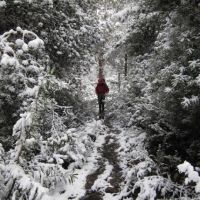 Chris Lamb
Chris LambThis transcription item is now locked to you for editing. To release the lock either Save your changes or Cancel.
This lock will be automatically released after 60 minutes of inactivity.